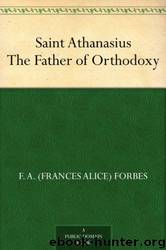Saint Athanasius The Father of Orthodoxy by F. A. (Frances Alice) Forbes

Author:F. A. (Frances Alice) Forbes
Language: eng
Format: mobi
Tags: d. 373, Patriarch of Alexandria, Christian saints -- Biography, Saint, Athanasius
Published: 2012-05-12T04:00:00+00:00
"You are rich enough and powerful enough for anything," retorted
Eusebius bitterly.
As for Constantine, he declared that he would uphold the decisions of the Council. Athanasius deserved to lose his life, but he would show indulgence. He therefore banished him to Treves in Gaul, and the Arians triumphed.
There was mourning and lamentation in Alexandria and throughout all Egypt when the tidings came. Many appeals were made for justice, but in vain. Even St. Antony, though he wrote to Constantine, could not move him. One thing alone the Emperor would not do in spite of all the persuasions of the Arians—appoint a successor to the absent Patriarch. Athanasius, indeed, continued to govern the diocese from his distant exile, writing continually to his Bishops and clergy, exhorting them to stand fast in the Faith and reminding them that the road to consolation lay through affliction.
Eusebius, in the meantime, was trying to force Alexander, the aged Bishop of Constantinople, to admit Arius to communion. Although ninety years old, he stood firm, and neither threats nor persuasions could move him. The Emperor was at last induced to fix a day on which Alexander was to receive the heretic or be driven from his see.
The Bishop appealed to Heaven. He ordered a seven days' fast throughout his diocese, during which the faithful were to pray that God would prevent such a sacrilege. On the eve of the appointed day, the aged prelate, having heard that Arius had arrived in the town, prostrated himself on his face before the altar. "Lord," he prayed, "if Arius must be received to communion in this church tomorrow, take me, I beseech Thee, from this world. But if Thou hast pity on Thy Church, suffer not, I pray Thee, that such a thing should be."
Arius at that very moment was being escorted in triumph around the city by his followers. Suddenly the heresiarch turned pale and trembled. He did not feel well, he said; he would rejoin them presently. The time passed, and he did not return. At last they went to look for him. It was but a dead body which they found, a sight before which even they turned pale. Arius had been overtaken by a sudden and horrible death.
The fate of the heresiarch made a great impression on the Emperor, who had himself but a short time to live. During his last illness he was haunted by the thought of Athanasius. His eldest son, Constantine II, who held his court at Treves, was a firm friend of the exiled Bishop; the dying Emperor sent him a secret message to restore Athanasius to his see. He then received Baptism at the hands of Eusebius of Nicomedia, and died a few days later.
Constantine's empire was divided between his three sons, Constantine, Constans and Constantius. The two former, who were staunch friends of Athanasius, would die within twelve years of their father. Then Constantius, who had inherited all the weakness and none of the good qualities of Constantine the Great, and
Download
This site does not store any files on its server. We only index and link to content provided by other sites. Please contact the content providers to delete copyright contents if any and email us, we'll remove relevant links or contents immediately.
| Military | Political |
| Presidents & Heads of State | Religious |
| Rich & Famous | Royalty |
| Social Activists |
Waking Up in Heaven: A True Story of Brokenness, Heaven, and Life Again by McVea Crystal & Tresniowski Alex(37786)
Empire of the Sikhs by Patwant Singh(23074)
We're Going to Need More Wine by Gabrielle Union(19034)
Hans Sturm: A Soldier's Odyssey on the Eastern Front by Gordon Williamson(18575)
Leonardo da Vinci by Walter Isaacson(13318)
The Radium Girls by Kate Moore(12018)
Tools of Titans by Timothy Ferriss(8366)
Educated by Tara Westover(8046)
How to Be a Bawse: A Guide to Conquering Life by Lilly Singh(7472)
Permanent Record by Edward Snowden(5839)
The Last Black Unicorn by Tiffany Haddish(5629)
The Rise and Fall of Senator Joe McCarthy by James Cross Giblin(5275)
Promise Me, Dad by Joe Biden(5141)
The Wind in My Hair by Masih Alinejad(5092)
A Higher Loyalty: Truth, Lies, and Leadership by James Comey(4954)
The Crown by Robert Lacey(4807)
The Iron Duke by The Iron Duke(4349)
Joan of Arc by Mary Gordon(4101)
Stalin by Stephen Kotkin(3957)
